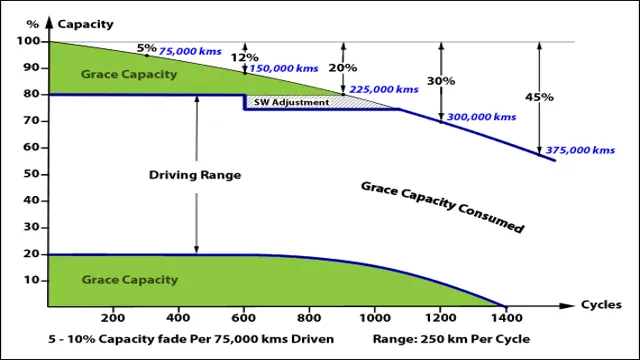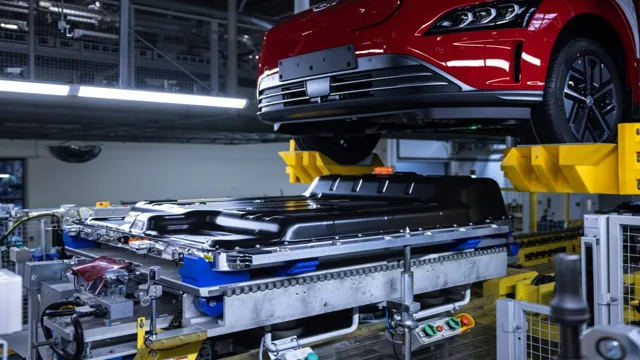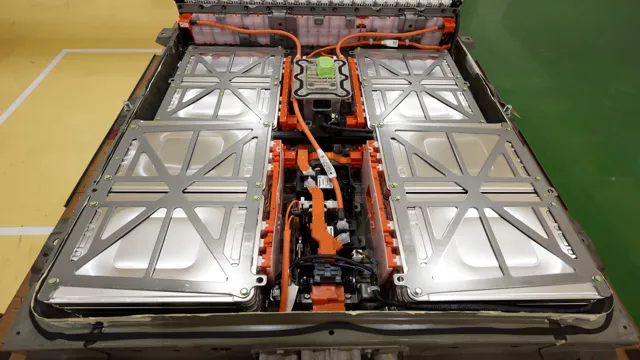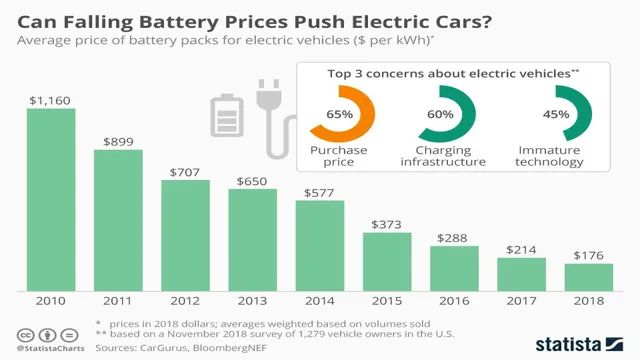Revving Up Your Ride: Let’s Talk Battery Life for Electric Cars
Electric cars have long been touted as the eco-friendly and cost-effective alternative to gas-guzzling vehicles. But, as with any new technology, there are plenty of questions that remain unanswered. One of the most common concerns for prospective electric car owners is the battery life: how long will it last, and what can they do to prolong it? The truth is, while battery technology has come a long way in recent years, the answer is not always straightforward.
In this blog post, we’ll take a closer look at the factors that affect battery life for electric cars and provide some tips for maximizing its longevity. So, if you’re considering making the switch to an electric vehicle, read on to find out more!
Overview of Electric Car Battery Life
Battery life is one of the main concerns for electric car owners. Unlike traditional cars, electric cars rely solely on their battery packs to power their engines. The lifespan of an electric car battery varies depending on several factors, including the type and quality of the battery, the frequency of use, and the environmental conditions in which it is used.
Lithium-ion batteries, which are commonly used in electric cars, typically have a lifespan of around 8-10 years and can last up to 100,000 miles before needing to be replaced. However, this can vary greatly depending on how the battery is used and how well it is maintained. It is important to follow the manufacturer’s guidelines for charging and maintaining the battery to ensure it lasts as long as possible.
Despite the cost of replacing the battery, owning an electric car can still save you money in the long run, as you will save on fuel costs and maintenance expenses.
Factors Affecting Battery Life
Electric car batteries are a crucial component of any electric vehicle. Battery life is one factor that plays a vital role in the overall performance and efficiency of electric cars. Several factors affect the battery life of an electric vehicle.
Temperature is one of the most significant factors that influence the longevity of electric car batteries. Excessive heat can reduce the lifespan of batteries, while cold temperatures can cause them to function less efficiently. The age of the battery also plays a role in battery life.
As a battery ages, its capacity to hold a charge decreases, causing the vehicle’s range to decrease as well. Driving behavior also affects battery life. Aggressive driving and frequent rapid accelerations can significantly impact battery life, while a calm driving style can extend the battery’s life.
Proper battery maintenance, such as regular charging and taking appropriate measures to protect the battery from extreme temperatures, can also improve battery life.
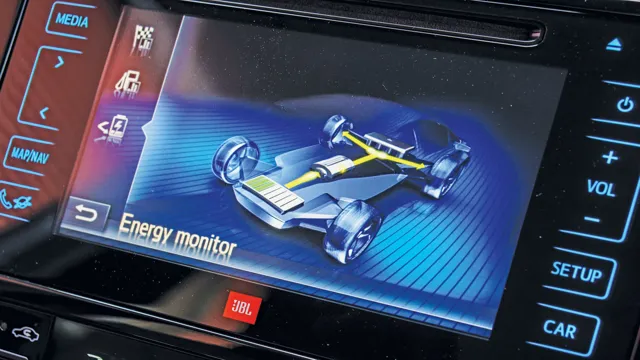
Battery Life Comparison of Popular Electric Cars
When it comes to buying an electric car, one of the main concerns for consumers is the battery life. The good news is that recent advancements in battery technology have made electric cars more practical and cost-effective than ever before. Most electric vehicles (EVs) have a range of 100 miles or more, with some models boasting up to 300 miles on a single charge.
The Tesla Model S, for example, has a range of up to 402 miles, while the Nissan Leaf has an estimated range of 150 miles. It’s important to note that battery life can vary depending on a variety of factors, including weather, driving style, and battery age. However, with the availability of public charging stations and the increasing popularity of electric cars, range anxiety is becoming less of a concern for buyers.
So, if you’re considering purchasing an electric car, know that you have plenty of options with impressive battery life to choose from, making it easier and more convenient than ever to go green on the road.
Increasing Your Electric Car Battery Life
Electric car batteries are an essential aspect of any electric vehicle and must be maintained properly to increase battery life for electric car longevity. There are many ways to extend the life of an electric car battery, including avoiding overcharging and discharging the car’s battery. Additionally, keeping the battery at a cool temperature, not exposing it to extreme temperatures, and using regenerative braking can help prolong battery life.
It’s also essential to keep the battery charged regularly and to ensure that it’s not sitting unused for long periods. Avoiding heavy acceleration, driving at a moderate speed, and not carrying much weight can all help reduce battery wear and tear. By following these tips, electric car owners can extend the life of their batteries and save money in the long run.
Tips to Extend Your Battery Life
Electric car batteries can be expensive to replace, so it’s important to take steps to increase their lifespan. One way to do this is to avoid charging your battery to 100% every time. This can put unnecessary strain on the battery and shorten its lifespan.
Instead, try to charge it only to 80 or 90%. Additionally, avoid letting your battery run completely out of charge. This can also damage the battery and reduce its overall lifespan.
As with all batteries, it’s important to keep your electric car battery cool to prevent it from getting too hot. Finally, be mindful of your driving habits. Aggressive driving, such as sudden acceleration and braking, can also decrease a battery’s lifespan.
By taking these simple steps, you can help extend the life of your electric car battery and avoid costly replacements.
Maximizing Your Driving Range
If you’re an electric car owner, you’re likely already familiar with the importance of maximizing your driving range. After all, one of the biggest factors that sets electric cars apart from their gas-fueled counterparts is the limited range of their batteries. Fortunately, there are many strategies you can use to extend your electric car’s battery life and get the most out of your driving experience.
One key strategy is to practice smart charging habits: avoid charging your battery all the way to 100% on a regular basis, and try to keep it between 20% and 80% charged whenever possible. Another important step is to keep your car’s battery at a moderate temperature. Extreme hot or cold temperatures can greatly reduce battery life, so aim to park your car in a temperate location and avoid leaving it out in the elements for extended periods.
By following these simple steps, you can maximize your electric car’s driving range and enjoy a more efficient, eco-friendly ride.
Understanding Battery Degradation
Electric car batteries experience degradation over time, which can reduce the car’s range and performance. However, certain strategies can help mitigate this issue and increase battery life. One way to do this is to avoid fully charging the battery or allowing it to drain too much.
Instead, it’s best to maintain a charge level between 20% and 80%. Additionally, drivers can utilize “smart charging” features, which charge the battery during off-peak hours when electricity is cheaper and less stressful on the battery. Another helpful tip is to avoid exposing the battery to extreme temperatures, which can cause faster degradation.
By taking good care of your electric car’s battery, you can enjoy longer range and better performance for years to come.
Future of Electric Car Batteries
Battery life for electric cars is a critical factor in determining the efficiency and demand for these vehicles. With advancements in technology, there is much excitement about the future of electric car batteries. The lithium-ion batteries currently used in most electric vehicles provide a good range of around 200 miles.
However, future batteries are expected to deliver even higher range and longer lifetimes between charges. Solid-state batteries, made entirely of solid materials, are one promising development that can store more energy in a smaller space than current batteries. Another breakthrough could be lithium-sulfur batteries, which can provide a range of up to 500 miles on a single charge.
The advancements in electric car batteries are expected to make electric vehicles more accessible to people and the cost of owning and maintaining batteries will reduce over time. It’s exciting to think about what other innovative ideas will emerge to extend the reach and lifespan of electric car batteries in the coming years.
Advancements in Battery Technology
One of the biggest challenges the electric vehicle industry faces is the limitation of battery technology. However, tremendous advancements have been made in recent years, offering hope for the future of electric car batteries. Manufacturers are now turning their attention towards solid-state batteries, which have the potential to store more energy, charge faster, and last longer than traditional lithium-ion batteries.
With solid-state batteries, the need for cooling and heating systems to regulate battery temperature will also be eliminated, leading to lighter and more energy-efficient electric vehicles. Additionally, artificial intelligence is being used to develop smart batteries that can monitor and manage their own performance, leading to improved safety and reliability. These advancements are expected to revolutionize the electric vehicle industry and accelerate the transition towards sustainable transportation.
Expected Improvements in Battery Life
The future of electric car batteries is looking bright, with expected improvements in battery life on the horizon. As technology advances, so too will the capabilities of these batteries. The current average range for an electric vehicle is around 200-300 miles on a single charge, but experts predict that these numbers could double or even triple in the coming years.
This means that electric cars will become more practical for everyday use, as drivers will be able to travel longer distances without the need for frequent charging. This is great news for both the environment and the economy, as electric vehicles become a more viable and accessible option for consumers. The advent of solid-state batteries, which offer higher energy density and faster charging times, is also expected to revolutionize the industry.
As the technology improves and the cost of production decreases, we can expect to see electric cars become a more common sight on the roads.
Conclusion
In the world of electric cars, battery life is king. Without a strong battery, even the most advanced electric car is just a glorified golf cart. So, just like you wouldn’t trust a marathon runner with weak knees, you shouldn’t trust an electric car with a weak battery.
In fact, if you want to make the most out of your electric car, you need a battery that’s tough, durable, and long-lasting. In short, a battery that’s built for the long haul.
FAQs
How long does the battery last in an electric car?
The battery life in an electric car varies depending on the make and model, but generally, it can last from 100 to 300 miles on a single charge.
Can a dead battery in an electric car be jump-started like a traditional car?
No, a dead battery in an electric car cannot be jump-started like a traditional car. It requires a special charging station or a portable charger.
Is it expensive to replace the battery on an electric car?
Yes, it can be expensive to replace the battery on an electric car, with costs ranging from $5,000 to $15,000 depending on the make and model.
How can I extend the battery life of my electric car?
To extend the battery life of your electric car, you can keep the battery charged between 20 to 80 percent, avoid leaving the car in extreme temperatures, and limit the use of high power-consuming features like air conditioning and heated seats.
